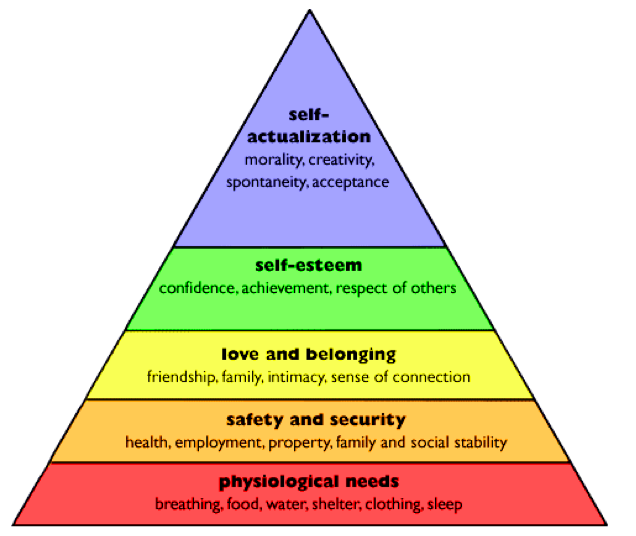In a psychology class, and after discussing Maslow’s hierarchy of needs and how it explains how motivation in humans works, the professor asked “How do explain the people who became artists/musicians/..etc and achieved a level of fulfillment and happiness but also has been poor and did not having all life essentials?”. This question triggered me, maybe because it’s linked to the topics of happiness and satisfaction and how do we define them and most importantly how can I apply them in my life.
What is Maslow’s hierarchy?
Maslow’s hierarchy as defined in Wikipedia is a theory proposed to explain human acts’ motivations, and how do our motivations grow and move-through to reach the top level which he called ‘self transcendent’ or ‘self actualization’.
Ultimately the theory pictures the shape of a pyramid consists of five levels (or six in some graphs). The levels starts with our most basic needs to survive at the bottom then goes through the human needs ranking them by their importance to our lives.

Maslow’s pyramid as his Hierarchy Of Needs theory explains it
How did I explain it?
Going back to the question of the professor. Let’s rephrase the question as follows, “How do you explain people who can reach a level of self actualization and fulfillment without achieving the lower levels of the pyramid?“
How I see it is that people have different definitions of what is “enough”, and “enough” is the keyword here. What is enough food for one person maybe not enough for another. An artist or a musician who finds his joy in painting or playing instruments without really caring if he is does have food for his dinner or not, sees that it’s enough for him to eat what will keep him alive. For another person “enough” means being assured to get three meals on his table everyday. For another, it’s the three meals plus desserts, appetizers and maybe chocolate bars every once in a while. “Enough” is our basic requirement that if we fulfilled we’ll step up in Maslow’s pyramid looking for our next need. This example applies to the rest of the needs as well. Love and belonging is not a necessity for everyone, the minimum of it is enough for some people. Self esteem and acceptance can be attained by different things, maybe the creative work produced by a creator, that open-source application you contributed to, or your regular contribution to charities and so on.
Humans are greedy by nature, and being satisfied with what is currently achieved in one level is not actually a nature of us. Even if you can fulfill the first level of physiological needs by eating a sandwich of falafel from a food truck for instance, yet a rich person would like to eat a better meal, maybe an expensive one in a good restaurant with good service. So if this rich person did not get his requirement as he want it; he won’t be satisfied. One more, it is possible to survive by drinking water only, yet neither I nor you would feel satisfied if we were banned from drinking juices and refreshments for example. The whole point I want to say is that if you have less requirements you’ll be able to achieve them easily.
To portray that, the smaller the height of your levels, the easier it becomes to fulfill them and reach the top of the pyramid.
I’m sure this is not a new idea, it has been around since the existence of the first philosophers probably. Religions also have encouraged the idea of having less needs in “Dunya” or the first life, known in Islam as “Zuhd”. Also it’s linked to the recent hype of “minimalism”.
I don’t say a person should have smaller goals, but I say a person should have less requirements. Having less load to carry will make it easier for you to climb the pyramid.
To sum up, always keep your “enough” less than what is possible for you to afford. Also take a look at Tim Urban’s article, I think he tackled the topic better than me. And if you’re interested in human’s motivations theories, Wikipedia’s page is a good start.
– Omar